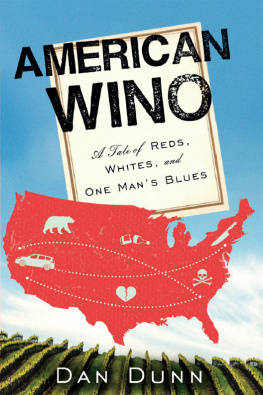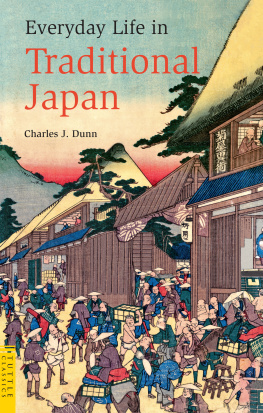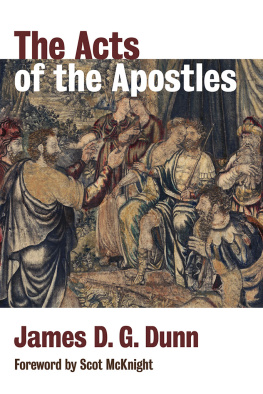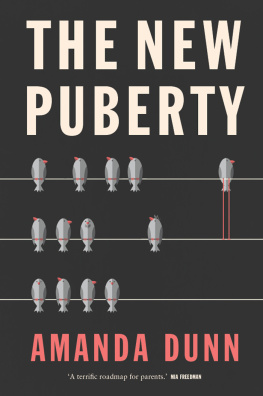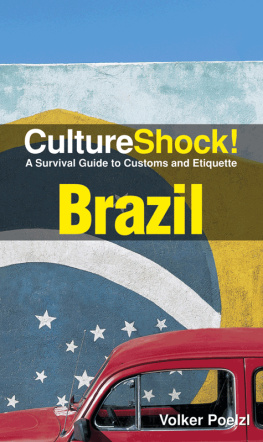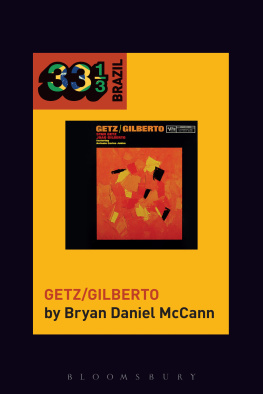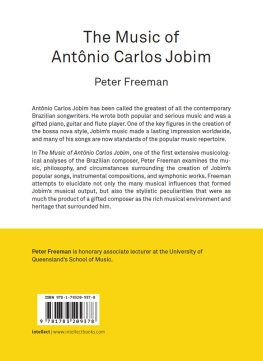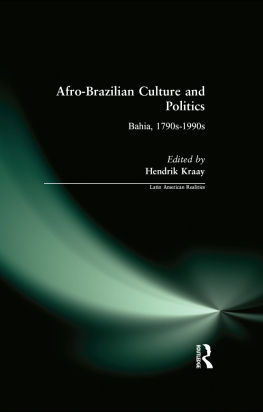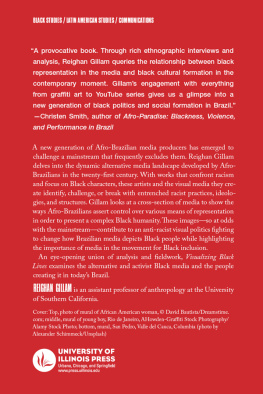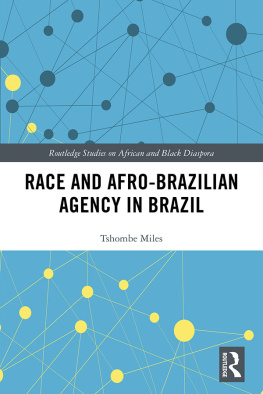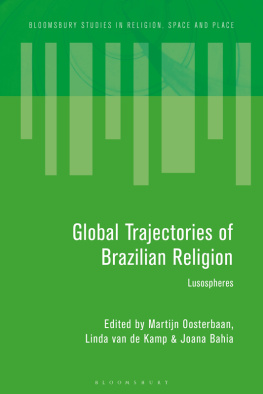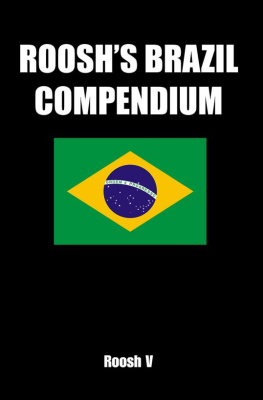BRUTALITY GARDEN
2001 The University of North Carolina Press
All rights reserved
Manufactured in the United States of America
Designed by Richard Hendel
Set in Quadraat, Spontan, and Lithos types
by Tseng Information Systems, Inc.
The paper in this book meets the guidelines for permanence and durability of the Committee on Production Guidelines for Book Longevity of the Council on Library Resources.
Library of Congress Cataloging-in-Publication Data
Dunn, Christopher, 1964
Brutality garden : Tropiclia and the emergence of a
Brazilian counterculture / Christopher Dunn.
p. cm.
Includes bibliographical references and index.
ISBN 0-8078-2651-0 (cloth : alk. paper)
ISBN 0-8078-4976-6 (pbk. : alk. paper)
1. Tropiclia (Music)BrazilHistory and criticism. 2. CountercultureBrazilHistory20th century. I. Title.
ML3487.B7 D86 2001
306.484dc21 2001035148
05 04 03 02 01 5 4 3 2 1
The publication of this book was supported by generous contributions from the Roger Thayer Stone Center for Latin American Studies, the Dean of Liberal Arts and Sciences, and the Graduate School of Tulane University.
For my parents, John and Gwenn Dunn, with admiration, gratitude, and love
CONTENTS
CHAPTER 1
Poetry for Export: Modernity, Nationality, and Internationalism in Brazilian Culture
CHAPTER 2
Participation, Pop Music, and the Universal Sound
CHAPTER 3
The Tropicalist Moment
CHAPTER 4
In the Adverse Hour: Tropiclia Performed and Proscribed
CHAPTER 5
Tropiclia, Counterculture, and Afro-Diasporic Connections
CHAPTER 6
Traces of Tropiclia
ILLUSTRATIONS
Caetano Veloso and Gilberto Gil, 1968
Tom Z, 1968
Gilberto Gil and Os Mutantes, 1967
Still from Glauber Rochas film Terra em transe, 1967
Scene from Teatro Oficinas production of O rei da vela, 1967
Caetano Veloso and Gilberto Gil, 1968
Caetano Veloso exhibits toy stove, 1968
Brazilian artists participate in protest march, 1968
Caetano Veloso on TV program hosted by Chacrinha, 1968
Gilberto Gil performs at International Song Festival, 1968
Caetano Veloso, Os Mutantes, and American singer perform at International Song Festival, 1968
Gal Costa and studio audience at TV Record music festival, 1968
Rita Lee, Tom Z, and Jlio Medaglia at TV Record music festival, 1968
The tropicalists perform on their TV program Divino Maravilhoso, 1968
Gilberto Gil and Jimmy Cliff in Salvador, 1980
Caetano Veloso and Gilberto Gil in New York during Tropiclia Duo tour, 1994
Tom Z and Tortoise perform in Chicago, 1999
Gilberto Gil performs in New Orleans, 1999
A section of color plates follows page
ACKNOWLEDGMENTS
I have a vague sense that the remote origins of this book can be traced to a moment in 1985, when I was visiting the home of Peter Blasenheim, my professor of Latin American history at The Colorado College. We spent an evening listening to his favorite Brazilian songs collected during several extended research trips, including Joo Gilbertos sublime distillations of bossa nova, Elis Reginas jazz-bossa hits, Chico Buarques plaintive sambas, Roberto Carloss romantic ballads, and several protest anthems from the 1960s. At the time, I was barely conversant in Spanish, much less Portuguese, the wonderfully sonorous language I first heard on those albums in Colorado Springs. I was captivated by the sound of the language combined with the music and fascinated with his explanations of each song. At one point, Peter pulled out a copy of Tropiclia, ou panis et circencis, a strange concept album from 1968, during which time Brazil was entering the most repressive phase of military rule.While most of the other albums he played that evening seemed relatively comprehensible given my limited knowledge of Brazil, this one seemed ambiguous and utterly confusing to me. Was it a patriotic celebration of life in the tropics? Or was it a wicked satire? Was it an apology for modernization under military rule? Or was it a protest album?
I later found out that the album I heard that evening was the album-manifesto of a movement known as Tropiclia or Tropicalismo. In 1992, I had the opportunity to interview key participants in this movement, Caetano Veloso, Gilberto Gil, and Tom Z, for a National Public Radio program dedicated to the twenty-fifth anniversary of Tropiclia produced by Sean Barlow and Ned Sublette for Afropop Worldwide. At the time, I was pursuing a graduate degree in Portuguese and Brazilian Studies at Brown University and I realized that Tropiclia was a compelling topic for further study. With help from a Fulbright student grant, I was able to return to Brazil and carry out the research for my Ph.D. dissertation, The Relics of Brazil: Modernity and Nationality in the Tropicalista Movement, which provided the basis for this book. I will forever be indebted to Nelson Vieira, Luiz Valente, and Thomas Skidmore, who formed my dissertation committee. Each of them contributed in distinct ways to my understanding of Tropiclia within the context of modern Brazil. I also wish to thank Anani Dzidzienyo, Onsimo Almeida, and Neil Lazarus, who greatly enriched my intellectual experience at Brown University.
I would like to express my profound gratitude to all of the Brazilian artists who generously shared their insights with me, including Caetano Veloso, Gilberto Gil, Jos Celso Martinez Corra, Augusto de Campos, Rogrio Duarte, Gilberto Mendes, Jlio Medaglia, and Waly Salomo. My deepest thanks are for Tom Z and Neusa Martins, who have been particularly helpful and generous.
In Brazil I was very fortunate to meet with scholars whose work has enriched my understanding of Tropiclia. I would like to thank Carlos Calado, Celso Favaretto, Carla Gallo, Marcelo Ridenti, Hermano Vianna, Durval Muniz de Albuquerque Jr., Roberto Schwarz, Helosa Buarque de Hollanda, Silviano Santiago, Srgio Miceli, Renato Ortiz, Evelina Hoisel, and Liv Sovik. I would also like to send aquele abrao to my friends in Brazil who helped me in different ways before and during the development of this project: Pedro and Roberto Amaral, Adilea, Helena, and Susana de Castro, Denise Cavalcanti, Fernando Velloso, Edgard Magalhes, Eliana Stefani, Ftima and Joo Farkis, Teresa and Dan Nakagawa, Eullia dos Santos, Ceres Santos, Ccero Antnio, Silvio Humberto, and Ismael Mazza. I am especially grateful for the friendship and hospitality of Vitria Aranha and Paul Healey.
I wish to thank several scholars of Brazilian culture in the United States, including Leslie Bary, Barbara Browning, Leslie Damasceno, David George, Randal Johnson, Emanuelle Oliveira, and Robert Stam, who have contributed in different ways to the development of this book. I am especially indebted to Charles A. Perrone, a leading authority on Brazilian popular music, who has been a great friend and an insightful critic of my work. J. Lorand Matory read an early draft of the manuscript and has been a great source of encouragement and inspiration since I first entered graduate school. Special thanks to friends Nick Nesbitt, Richard Schuler, Robert Arellano, and T. R. Johnson, who have, at one stage or another, shared their thoughts on Tropiclia, popular music, and the 1960s with me. These friends and colleagues deserve credit for the strengths of this book but bear no responsibility for its shortcomings.
During the last five years, Tulane University has provided a most collegial and stimulating environment for the development of this project. I would like to thank my colleagues from the Department of Spanish and Portuguese, especially Harry Howard, Maureen Shea, Henry Sullivan, and Nicasio Urbina. I am particularly indebted to my friend and colleague Idelber Avelar. He has foregrounded the task of mourning in his own work but has also reminded me of the primacy of
Next page

